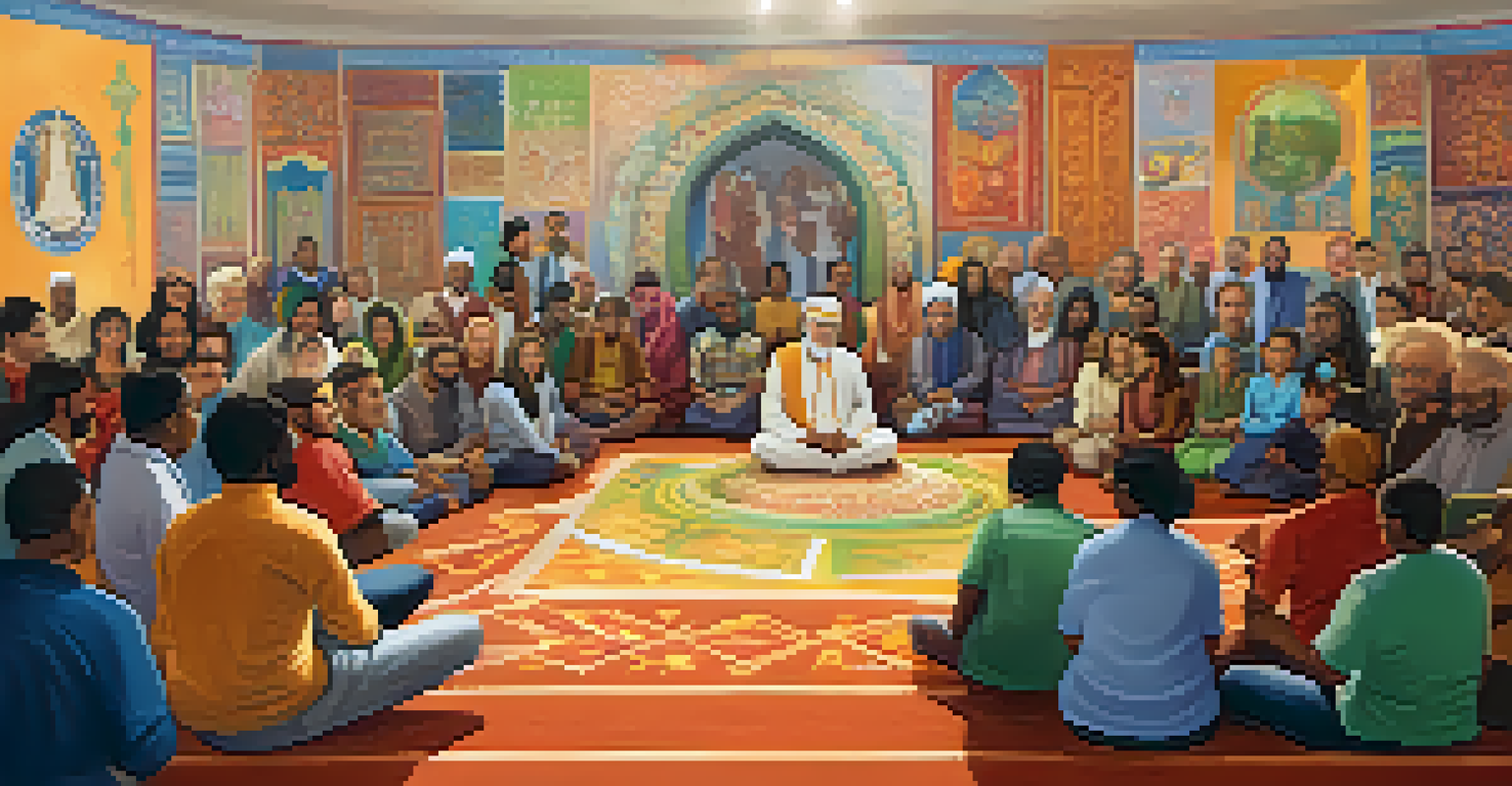Spiritual Beliefs and Their Role in Social Justice Movements

Understanding Spiritual Beliefs in Social Contexts
Spiritual beliefs often serve as a guiding force in people's lives, influencing their values and actions. When we talk about spirituality, it encompasses a range of beliefs that provide purpose and meaning. These beliefs can motivate individuals to engage in social justice, as they may see it as a moral obligation driven by compassion and empathy.
Faith is taking the first step even when you don't see the whole staircase.
For instance, many faith traditions emphasize the importance of caring for the marginalized and oppressed. This sense of duty can unite communities around a common cause, fostering a collective spirit of activism. By grounding their efforts in spiritual beliefs, activists may feel empowered to address societal injustices with a sense of urgency.
Ultimately, understanding the role of spirituality in social contexts helps us appreciate how deeply intertwined our beliefs and actions can be. It showcases the potential for spiritual principles to inspire meaningful change in society.
Historical Examples of Spirituality in Activism
Throughout history, spiritual beliefs have played a crucial role in various social justice movements. One of the most notable examples is the American Civil Rights Movement, where figures like Martin Luther King Jr. drew on his Christian faith to advocate for equality and justice. His famous 'I Have a Dream' speech was steeped in spiritual references, highlighting how faith can illuminate the path toward justice.

Similarly, Gandhi's promotion of nonviolent resistance during India’s struggle for independence was deeply rooted in his spiritual beliefs. He understood that the pursuit of justice must be accompanied by a commitment to peace, reflecting the idea that spiritual integrity is essential in activism. These examples illustrate how spirituality can provide both inspiration and a framework for action.
Spirituality Fuels Social Activism
Spiritual beliefs can inspire and motivate individuals to engage in social justice efforts, fostering a sense of duty and collective activism.
By looking at these historical instances, we see that the intersection of spirituality and social justice is not just a modern phenomenon but a longstanding tradition. It reinforces the notion that belief systems can catalyze significant societal shifts.
Spirituality as a Source of Resilience
Engaging in social justice work can often be exhausting and disheartening, making resilience a crucial quality for activists. Spiritual beliefs can serve as a wellspring of strength, helping individuals cope with setbacks and challenges in their efforts. This resilience often stems from a belief in a higher purpose or a commitment to the greater good.
You must be the change you wish to see in the world.
For example, many activists turn to prayer, meditation, or community rituals to recharge their spirits. These practices can foster a sense of connection and solidarity, reminding individuals that they are part of a larger movement. This shared spiritual experience can empower activists to persist despite the difficulties they face.
Ultimately, the interplay between spirituality and resilience highlights how our beliefs can bolster our resolve to fight for justice. It shows that taking care of one's spiritual health is just as important as the activism itself.
The Role of Community in Spiritual Activism
Spirituality often thrives within communities, and this communal aspect can be vital for social justice movements. Faith-based organizations and groups provide a platform for individuals to come together, share their beliefs, and collectively work toward change. This sense of belonging can amplify individual efforts, creating a powerful force for justice.
For instance, community gatherings such as prayer vigils or interfaith dialogues not only strengthen bonds among participants but also raise awareness about social issues. These events foster a sense of solidarity, reminding members that they are not alone in their fight for justice. The collective power of community can lead to increased visibility and impact.
Resilience Through Spiritual Practices
Spirituality provides a source of resilience for activists, helping them cope with challenges and maintain their commitment to justice.
In this way, the role of community in spiritual activism cannot be underestimated. Together, individuals can harness their shared beliefs to inspire action and drive meaningful change.
Spirituality and Intersectionality in Social Justice
As social justice movements evolve, the concept of intersectionality has become increasingly important. This idea recognizes that individuals experience oppression in various forms, influenced by factors like race, gender, and class. Spiritual beliefs can play a role in understanding and addressing these intersections, encouraging a holistic approach to activism.
Many spiritual traditions promote inclusivity and the idea that all individuals deserve dignity and respect. By grounding social justice work in these principles, activists can create more comprehensive solutions that acknowledge the multifaceted nature of oppression. This ensures that all voices are heard and represented.
Ultimately, the integration of spirituality and intersectionality fosters a deeper understanding of social issues. It encourages movements to be more inclusive and responsive to the diverse experiences of marginalized communities.
Modern Spiritual Practices Supporting Justice Movements
In today's world, spiritual practices continue to evolve, finding new expressions within social justice movements. Many activists incorporate mindfulness, meditation, and other practices into their routines to maintain mental and emotional well-being. These practices not only support individual resilience but also foster a sense of collective purpose.
For example, organizations are utilizing online platforms to create virtual spaces for prayer and reflection, allowing activists to connect despite physical distances. This adaptation demonstrates how spirituality can remain relevant and accessible in our fast-paced, digital age. It shows that the pursuit of justice can be complemented by nurturing one's spiritual health.
Community Strengthens Activism
Communal spiritual practices amplify individual efforts in social justice movements, creating a powerful collective force for change.
As modern activism increasingly embraces these spiritual practices, it highlights the importance of holistic approaches to social justice. The blending of spirituality and activism can lead to more sustainable movements, ensuring that those involved are supported in both their beliefs and their actions.
The Future of Spirituality in Social Justice
Looking ahead, the role of spirituality in social justice movements will likely continue to evolve. As societal issues become increasingly complex, the need for a compassionate, values-driven approach will remain critical. Spiritual beliefs can provide a moral compass, guiding activists as they navigate new challenges.
Moreover, the growing emphasis on mental health and well-being within activism underscores the importance of spiritual practices. Activists are beginning to recognize that caring for their spiritual selves is essential for sustaining their efforts over the long term. This awareness may lead to more integrated approaches that prioritize both action and self-care.

In conclusion, the future of spirituality in social justice is bright, with the potential to inspire new generations of activists. By embracing both spiritual beliefs and social justice initiatives, we can create a more compassionate and equitable world.